Donations to orphaned boy top $2 million after Highland Park shooting
Fox News' Madeleine Rivera reports from Highland Park, Illinois, shares updates after attack on Fourth of July parade.
American parents may be wondering and worrying about how they should speak to their children about violence in the U.S., after a gunman opened fire on July 4 during a parade in the Chicago suburb of Highland Park. Neighbors and families had gathered, of course, to celebrate Independence Day on Monday.
Seven people were killed and at least 30 people were wounded in the shooting.
This occurred just weeks after a gunman opened fire at Robb Elementary School in Uvalde, Texas, killing 19 children and two teachers.
Clinical psychologists and experts have offered professional tips for parents and caregivers as instances of tragedy may ignite conversations inside the home.
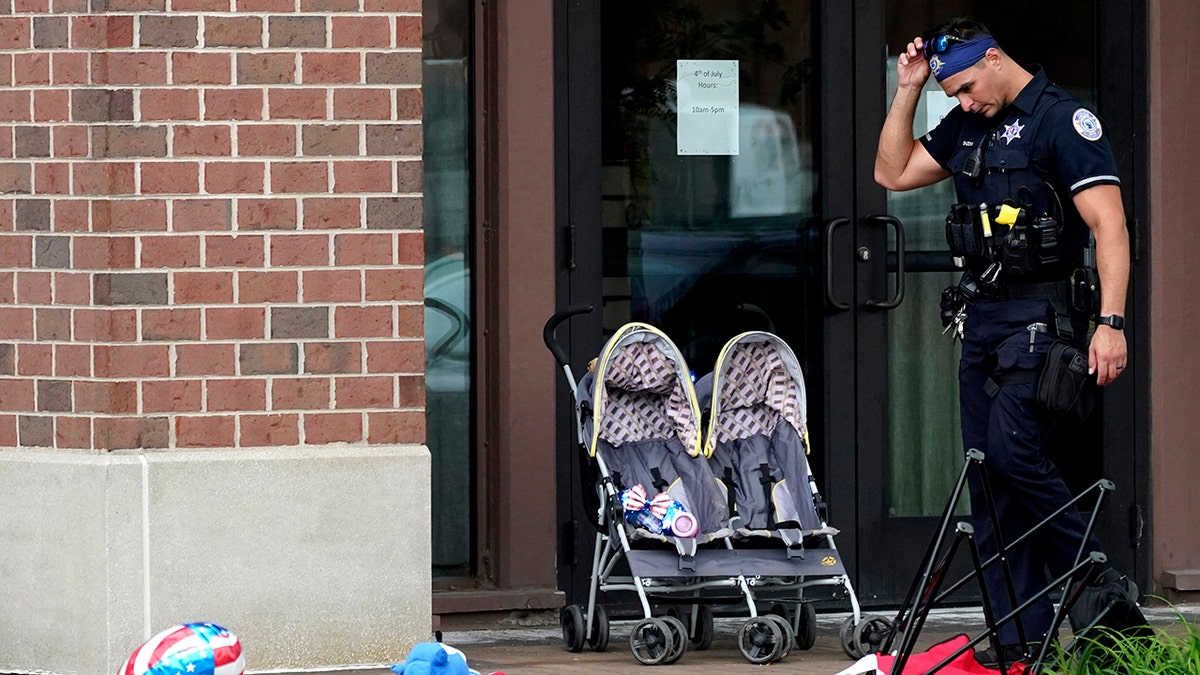
A police officer reacts as he walks in downtown Highland Park, a suburb of Chicago, on Monday, July 4, 2022, where a mass shooting took place at a Highland Park Fourth of July parade. (AP Photo/Nam Y. Huh)
Here’s how to talk with kids in an age-appropriate fashion.
For parents: First and foremost, process how you are feeling
"It's important to recognize where our [own] feelings and thoughts are with this before we even start to communicate with our kids," Stephanie Samar, a New York-based clinical psychologist, told Fox News Digital.
Samar, who specializes in mood and anxiety disorders in children, suggested talking with your significant other and or other adults and have initial conversations privately, without the children around.
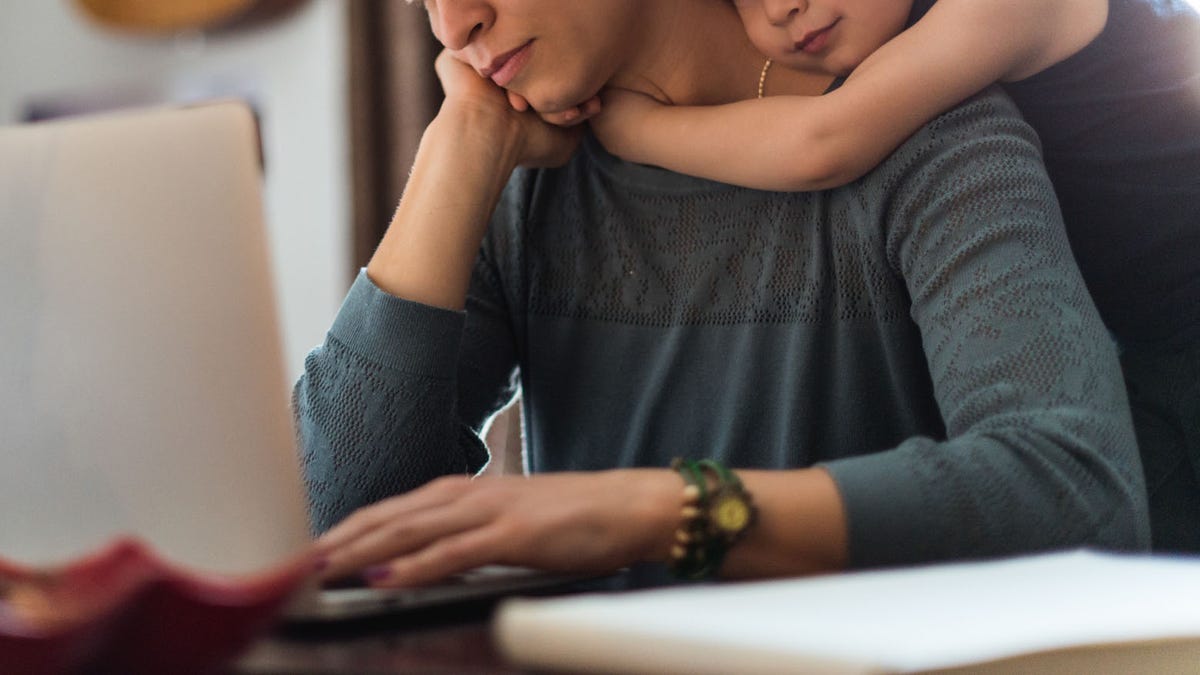
Dr. Samar suggested that parents and caregivers process their own thoughts, feelings and emotions surrounding news such as the July 4th Highland Park shooting before discussing the event with children. (iStock)
If adults are staying calm about it, it helps.
If parents become fixated on these topics, that can send alarm bells to kids.
Parents and caregivers should "try to model calm." This especially rings true if a child is more anxious or worried about violence than we want them to be, Samar said.
Remember that you’re the trusted source
Many children as young as middle school are using social media.
Samar said to ask children where and how they're consuming their information, in case they're piecing together their own narrative of what happened and what was covered in the news.

Parents looking to talk with their kids about the Highland Park shooting, or other instances of violence, should ask how they're gathering information about the event in order to ensure that it's factual. (iStock)
"We want our kids to get the information from us," she added.
"Don't avoid the topic. Give them the opportunity to ask questions and process what's going on in their heads."
TEXAS SCHOOL SHOOTING: HOW PARENTS SHOULD TALK TO THEIR KIDS ABOUT THE TRAGEDY
Samar suggested talking through the differences between opinions and true investigative journalism, which helps kids build "perspective and awareness on what’s factual and what’s there for the clicks," she said.
Follow your child’s lead
Dr. Samar noted that although parents are the trusted source, that doesn't mean moms and dads needs to give up information to their child or details that aren’t appropriate for young eyes and ears.
"Try instead to follow their lead," Samar said.
"For example, for some kids it is enough to say, ‘I’m feeling sad and angry today because some people were hurt at a parade’ — and then open the floor for your child to ask questions."
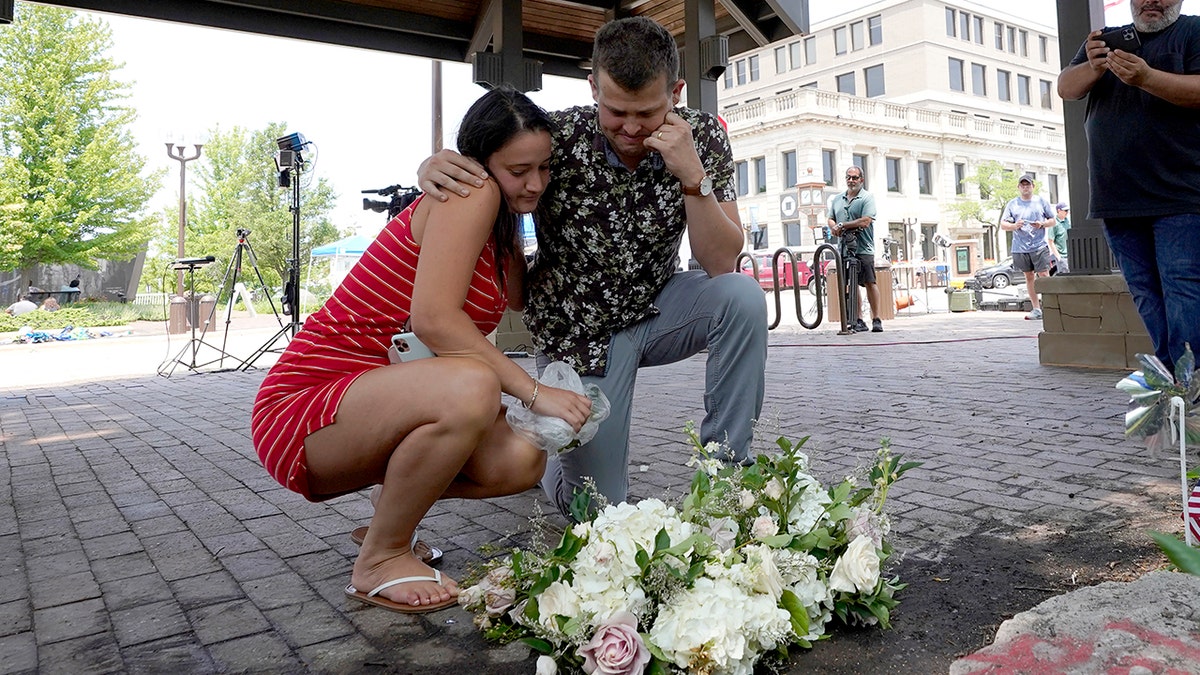
Brooke and Matt Strauss, who were married on Sunday, pause after leaving their wedding bouquets in downtown Highland Park, Ill., a Chicago suburb, near the scene of Monday's mass shooting, on Tuesday, July 5, 2022. (AP Photo/Charles Rex Arbogast)
In addition, restricting access to news coverage and social media can be helpful for everyone’s mental health, Samar noted.
"And remember your children are watching you, so if you model healthy coping skills they will follow your example," she said. "You can say, ‘Watching the news is making me feel sad and confused, I’m going to turn it off and take a break — do you want to go on a walk with me?’"
What to do if your children fear for their safety
"[Assure your kids] that they are safe right now because we don’t want them to try and predict the future about something that may not happen or does not exist," Dr. Jill Emanuele, vice president of clinical training at Child Mind Institute in New York City, told Fox News Digital in June.
"But sometimes, unfortunately, it does happen."
Following the Texas school shooting in Uvalde, Emanuele had suggested learning about the specific safety protocols at school — and include your children after you've had those conversations.
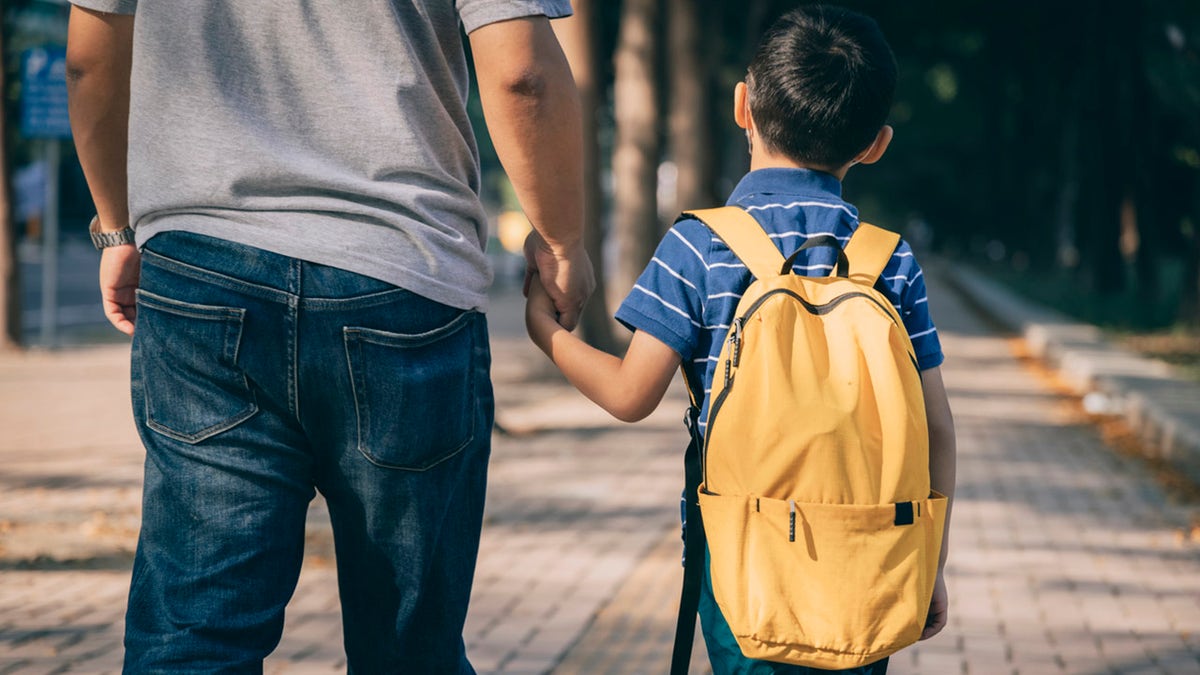
In June, following the Texas school shooting in Uvalde, Dr. Jill Emanuele, vice president of clinical training at Child Mind Institute in New York City, told Fox News Digital that if kids are nervous about their own safety, parents can learn about the specific safety protocols at school — and then include their children after they've had those conversations. (iStock)
"Say, ‘Let’s find out together your school's plans to deal with these issues. We will make sure you have all the information you need to keep you safe,’" she said.
Dr. Samar agreed that basic safety reminders can help a child feel at ease — however, do "be careful," she said.
"If your child tries to perseverate on their safety, that's when they may be dealing with a bit more anxiety," Samar said.
4 TIPS ON RAISING CONFIDENT CHILDREN: PARENTING EXPERTS
She added that if your child needs a ton of reassurance, you may want to consider having your little one speak with a professional.
As for safety tips outside of school, Samar suggested simple, parent-to-child advice such as, "If you were to get lost and feel in danger, this is where you go."
Avoid political discussions with young kids
Dr. Samar said that politics and gun control policies are tough topics for young children to consume and understand.
"They're coming from a place that's good or bad. They cannot see the gray area of things," she added.
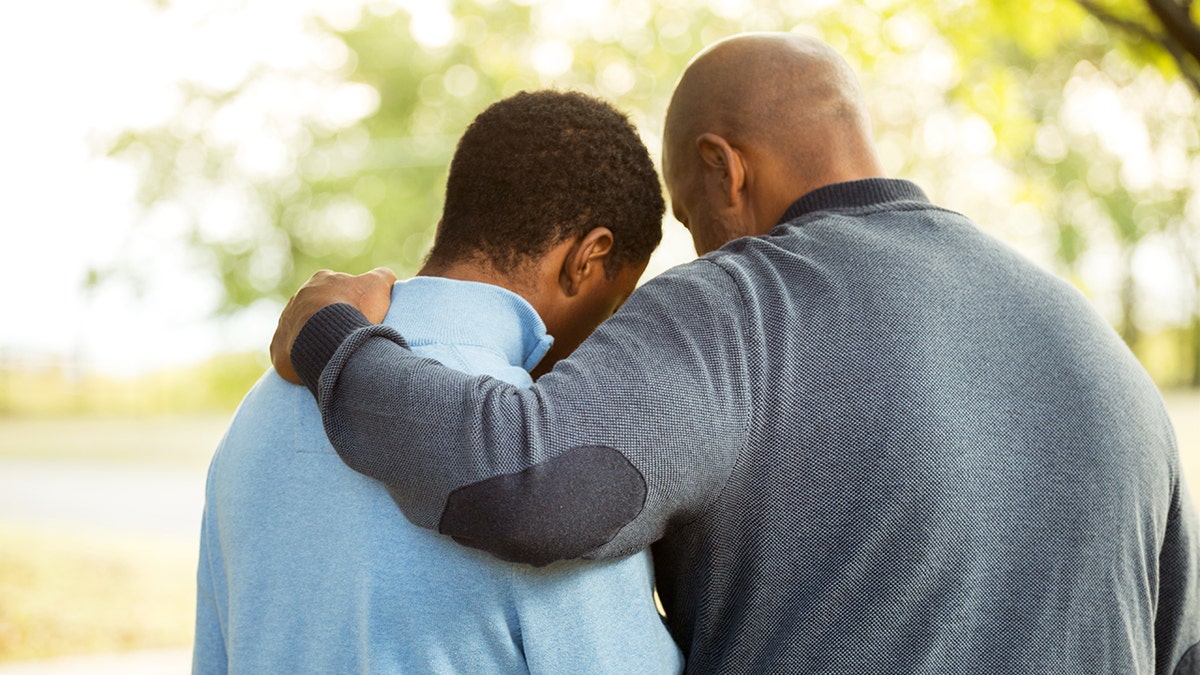
While young children do not understand political issues, middle and high school-aged kids may be already developing their own views. Samar suggested parents help them process their thoughts and if they're passionate, encourage them to get involved with community government. (iStock)
Samar stressed that if teens and middle schoolers are showing interest in the political conversation, help them process their thoughts.
"You may want to consider talking to them about their political views, answer any questions they have and help them get active in the community government around them as an introduction," Samar said.
Remind kids that Americans are resilient
Dr. Mary Karapetian Alvord, director of the Rockville, Maryland-based Alvord, Baker & Associates, LLC — and a psychologist specializing in treating children, adolescents and adults — advised parents not to "catastrophize" the event in front of young children who may only comprehend how "scary" the situation is, she told Fox News Digital in June following the Texas school shooting.
"We learned a lot after the 9/11 [terror attacks] [about] family support and the community support around it," Alvord said, adding that it’s still important to acknowledge sadness and grief.
CLICK HERE TO GET THE FOX NEWS APP
A parent might say, "‘It is terrible, [but] you are here, you are safe and these are the things we are doing to stay safe," she advised.
To demonstrate their resilience, people often take action.
Alvord said, "For young kids, that could be having a lemonade stand to raise money to help [the victims and their families]."
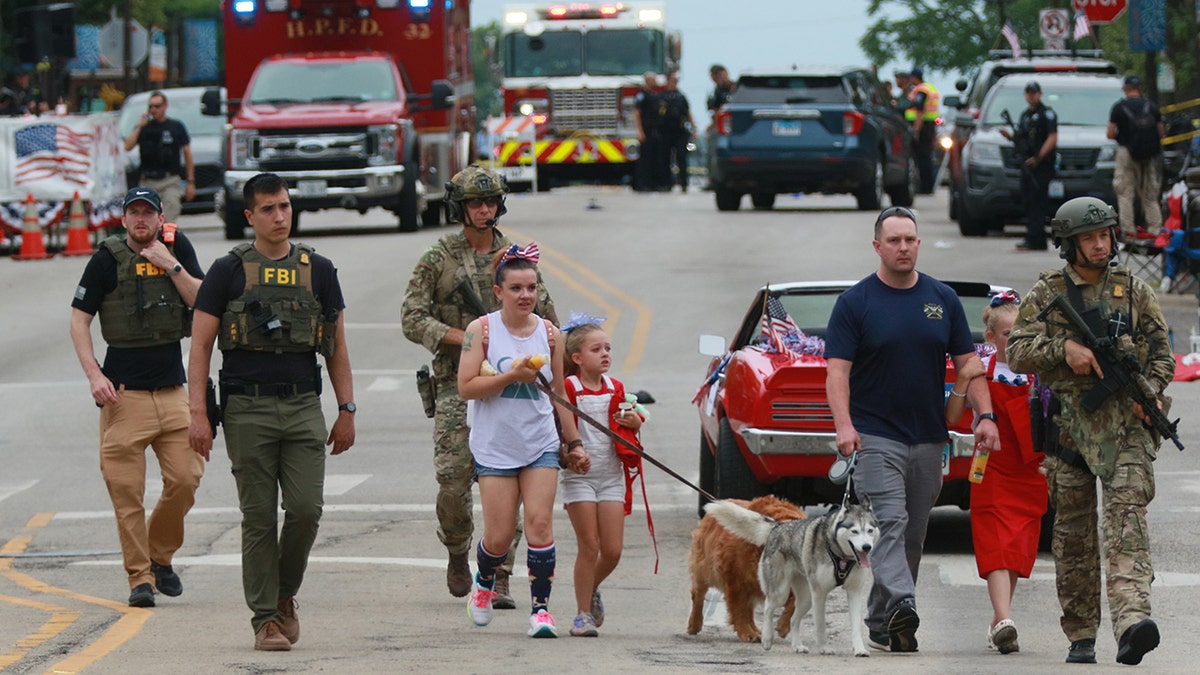
Law enforcement escorts a family away from the scene of a shooting at a Fourth of July parade on July 4, 2022, in Highland Park, Illinois. Police have detained Robert "Bobby" E. Crimo III, 22, in connection with the shooting. (Mark Borenstein/Getty Images)
Samar echoed that statement, noting that parents can encourage kids to do help "activate change" in an age-appropriate manner.
"Many of us are feeling helpless," Samar said.
CLICK HERE TO SIGN UP FOR OUR LIFESTYLE NEWSLETTER
"We feel like we don't have much control of what's happening around us and our kids are especially feeling that given that they can't participate. Giving them the option to impact change can give them a sense of empowerment."










































